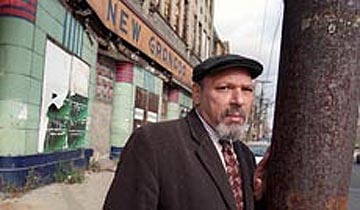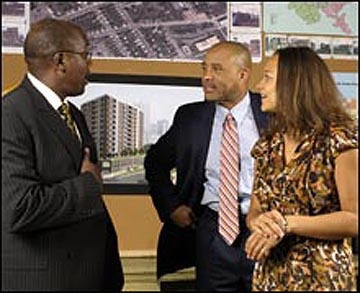Huntington Theatre Opens 25th Season with Final August Wilson Play
By: Charles Giuliano - Sep 15, 2006
Radio Golf
By August
Directed by Kenny Leon, Set, David Gallo, Costumes, Susan Hilferty, Sound, Dan Moses Schreier, Music, Kathryn Bostic
Huntington Theatre Company
Through October 15
617 266 0800
http://www.huntingtontheatre.com
Now celebrating twenty five years the Huntington Theatre Company of
The VIP audience of special guests of the university, including former president, John Silber, as well prominent members of the African American community, and the media settled in for what promised to be an historic occasion marking the end of the phenomenal career of an individual who single handedly defined the very essence of contemporary black art and theatre. No other artist of his generation more clearly resonated with high moral purpose, humor, insight and gravitas. The audience was up for the occasion and awarded the performers a sustained and sincere standing ovation.
That said, I found the play which is staged in the hard scrabble office of two upwardly mobile developers in 1997, overblown, ponderous, awkward in its preachy focus on social and political tensions between haves and have nots, and badly in need of cuts and edits as well as a faster pace in the direction. The play, which is directed by Kenny Leon, has had several stops before
Let's start with the set by David Gallo which is just overbuilt. The action is confined to the ground level a grungy office barely renovated and functional in the dilapidated old building which rises above it with broken windows and decaying brick. Before the action began the audience anticipates scenes taking place in that second story. It never happens. So that dead space above the office just becomes an allegory. Over the course of the play it is a distraction as we attempt to focus on what is transpiring in that single room, or office.
The plot focuses on an upwardly mobile, Cornell educated, realtor and developer, Harmond Wilks (Hassan El-Amin) who with a partner, Roosevelt Hicks (James A. Williams) have bought up and are in the process of tearing down dilapidated properties on the Hill and replace it with upscale housing and franchises such as Starbucks. We see a rendering of their planned construction. If they can pull this off Wilks aspires to run for Mayor and in that ambition is supported by his wife Mame Wilks (Michele Briana White) who is in line for a plum job in the Governor's office. She is helping to do PR for the campaign. We first sense the righteous morality and pride which will undermine Wilks when he argues with her about inviting the Police Commissioner to the ground breaking because he promoted an officer who shot and killed a black man. Her pragmatic point is just get to be the black mayor and then act on your convictions. We also glimpse his moral convictions when he advises caution to his partner who is being lured into a lucrative deal to be the front for the purchase of a black radio station by a white entrepreneur. Hicks has no moral issues with helping himself to the trough.
In a complex back story we learn that Wilks was the dutiful son of a tyrannical father who scratched and clawed to get ahead. Another brother defied the plans of his father by aspiring to play football at Gramling. When the father cut him off the brother volunteered for the army as a means of paying for his education. He died in
The plot turns when it appears that a shuffling old character Joseph Barlow (Anthony Chisholm) claims to still own the last standing abandoned property in the way of the development. He prevails on Hicks to act as his lawyer in a fight with city hall to get back the property. There is a second character, a former classmate of Hicks, Sterling Johnson (Eugene Lee) who is a handy man and contractor looking for work with the developers. He also proves to be a community activist. As Harmond looks into the matter it turns out that the purchase of the property was indeed handled improperly and Barlow does have a legitimate claim. The building is scheduled to be demolished and Harmond simply has to fail to act for that to happen. He offers Barlow a decent payment which the old man refuses as he would rather give the property to his daughter. We learn that although run down and abandoned it is actually a fine old house with wonderful vintage details. It becomes a signifier for what was once a vibrant community.
As the play develops there is a dichotomy and struggle between the middle class developers, who worship Tiger Lee as their role model, and just want to play golf and dabble in politics and the downtrodden tandem of Old Barlow and the community activist Johnson. We begin to hear Hicks refer to these nuisance characters as "niggers." This theme of blacks against blacks and the class struggle comes to a head in a conflict with the intuitive integrity and values of the "niggers" contrasted with the ruthless self interest of the "negroes" (Wilks and Hicks) who think and act like white people. This seems to me the essence and motive of
With its setting in 1997
We need a new generation of artists to take up where
Hats off however to a terrific cast that truly gave 110% to bring this final chapter of a great career to a fitting conclusion. They deserved a standing ovation by an audience arguably not ready to ask tough questions about the work of an icon of contemporary black theatre. Perhaps that critical dialogue will spill over into the next generation. Let's hope so.



